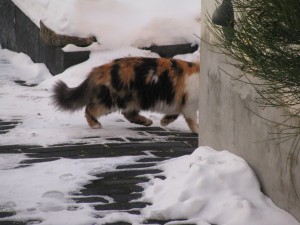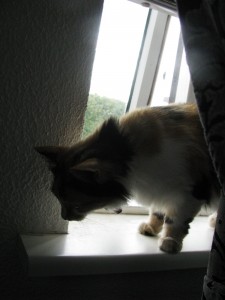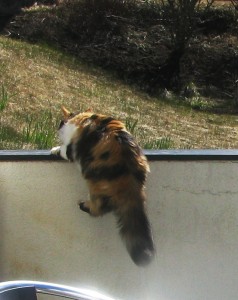Gray cats and other ones too. Posted by hulda on Feb 27, 2014 in Icelandic culture, Icelandic customs
 Icelanders love cats. A generalization, I know, but I have to say I haven’t seen many places with as many of them, clearly well-kept and tame, roaming around everywhere. When you walk downtown on a sunny day and see them lying around here and there it’s easy to see that they’re not wild cats, the Icelandic idea of cat ownership just often includes letting them walk outside as they wish.
Icelanders love cats. A generalization, I know, but I have to say I haven’t seen many places with as many of them, clearly well-kept and tame, roaming around everywhere. When you walk downtown on a sunny day and see them lying around here and there it’s easy to see that they’re not wild cats, the Icelandic idea of cat ownership just often includes letting them walk outside as they wish.
This does not mean tragedies wouldn’t strike every now and then. Losing a cat under a car is sadly typical and my FB wall constantly bears “Cat gone missing, please share!” notices which usually spread around like wildfire. Notices on dogs are far less common for a few reasons: first of all dogs are much, much rarer as pets than cats are, especially in the Capital City area. Dogs were in fact banned from entering cities once upon a time and to a large extent are still regarded as farm animals, although nowadays they’re taking a larger spot as a pet, but cats… cats have always been pets. Going back in time everyone used to need them for vermin control and as a friend, with a surprising amount of stress put on the friend-part which has continued to this day although mice are no longer a problem. It’s not uncommon to see a local person stop at a cat for a short scratching moment, and there’s no difference in gender, sex or social status when it comes to having a chat with cats here. 😀
The second reason is that dogs are simply not let wander around – who would do that? Cats, on another hand, have often near perfect freedom limited only by the borders of their own territories. Our house seems to be on one such border because we get frequent visits from at least three cats and see two others shyly crossing the yard every now and then. By visits I mean suddenly finding one near or on the windowsill, out- or inside the house depending on whether the window’s open or not.
The very word for “cat”, köttur (M), is important to learn by heart. Not only because cats are such a common theme here but because it’s a word that’s highly irregular in declension.
Other words that mean cat are kisi (M) and kisa (F), both of which would probably best translate as “kitty”. Their declension is regular so if you cannot remember the right declension form for köttur, use either of these. 😉
Cats naturally feature a lot in málhættir, proverbs. Here’s some of my own favourites:
“Að fara í kringum eitthvað eins og köttur í kringum heitan graut” (= to go around something like a cat circling hot porridge): to show keen interest in something without mentioning the core of the issue, rather circling around it, in English “to beat around a bush” would have the same meaning. In use you’d have to change the proverb a little according to who’s doing what, f.ex. “Hún fer í kringum það eins og köttur í kringum heitan graut” (= she’s circling that like a cat with hot porridge).
 Þessi kisan er eins og grár köttur hjá okkur.
Þessi kisan er eins og grár köttur hjá okkur.
“Að vera eins og grár köttur einhvers staðar” (= to be like a gray cat at a certain place): to be always hovering near or at a certain place, comes with a nuance that adds “without any seemingly obvious reason”. “Ég var eins og grár köttur hjá þeim” (= I was constantly hanging out/loitering at their place).
“Að fara í hund og kött” (= to go dog and cat): to go absolutely haywire. 😀 “Það fór allt í hund og kött” (= Everything fell apart/went haywire). This one is actually a newer version of an older proverb, “að fara í hund og hrafn“, where raven has the place that cat took over later on.
“Að kaupa köttinn í sekknum” (= to buy a cat in a sack): exactly as it sounds like, to buy a cat in a bag/to buy something without seeing it first or without knowing the true (and lesser) value of the item.
“Að fara í jólaköttinn” (= to go/end up at the Christmas cat): quite a sad one, means that you didn’t get a single thing for Christmas. This can also apply to not getting any items of clothing for Christmas but it’s more commonly used for being given nothing at all.
Proverbs read out loud here – as usual there are English captions you can turn on. 🙂
There are also idioms featuring cats, such as kattaþvottur (= cat’s washing, a totally lazy/haphazard way of cleaning up something)(alternatively this one can also mean licking your finger to pick up crumbs etc.), kattliðugur (= cat-nimble, a very nimble person) and, interestingly, kattþrifinn (= cat-cleaned, very thoroughly cleaned up).
If you’re planning on moving here be prepared that the cats are a thing and that they’re not going away. They’ll be in your way everywhere, some minding their own business and some yours. It’s best to just get used to them right away, like I eventually did but would have done sooner had I known that trying to battle the visits of the neighbours’ cats was doomed to fail from the start (although if that red one keeps using our potato patch as her personal sandbox I’m going to buy a vuvuzela)…
Retro Stefson, a band from my hometown Reykjavík will get a turn today. They started in 2006 and have published three albums so far. The music of course is amazing, but there are also some interesting Reykjavík street scenes in Glow (here) and Kimba (here). A third one on the list of recommendation is Qween (here).
All photos in this entry belong to me.

Build vocabulary, practice pronunciation, and more with Transparent Language Online. Available anytime, anywhere, on any device.
About the Author: hulda
Hi, I'm Hulda, originally Finnish but now living in the suburbs of Reykjavík. I'm here to help you in any way I can if you're considering learning Icelandic. Nice to meet you!








Comments:
Tanja:
I’ve just read about the skuggabaldur? Have you heard about this typical Icelandic guy too? The mother is a fox, the father a cat …
hulda:
@Tanja Oh yes! It’s quite a scary beast, just like the other cat-fox creature (mother a cat, father a fox) called skoffín. I wrote a little bit of the both of them here:
https://blogs.transparent.com/icelandic/2012/10/18/dont-let-them-see-you/